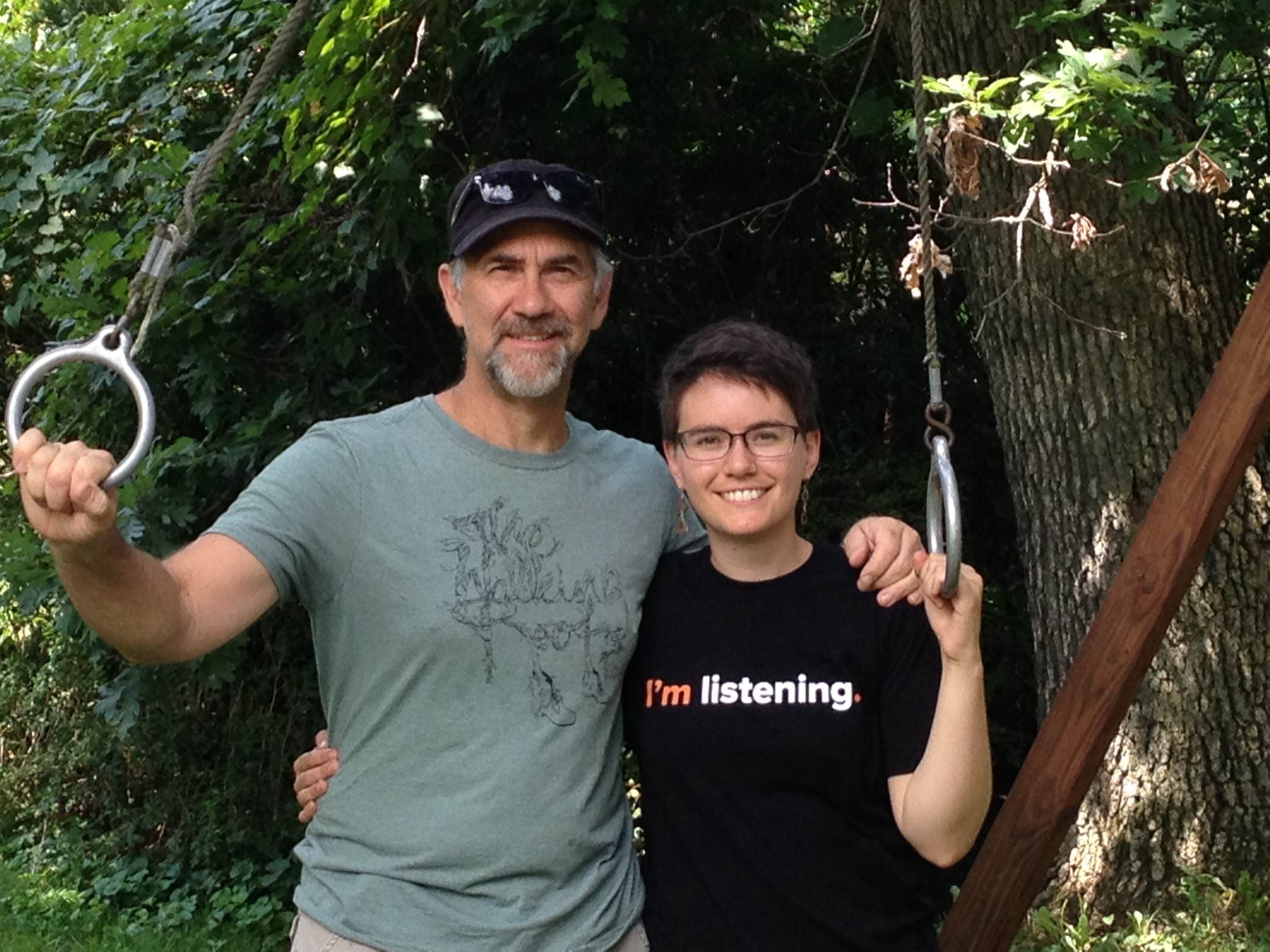Overheard with Ted
By Alison Brookins

Alison, an AMBS student, interned with Ted & Co over the Summer and is now a roadie on the Laughter is Sacred Space: Human Faces Tour helping with tech and set up and other various and needful tasks. Here’s her blog about what she learned during her time with Ted, which she chronicled as “overheardwithted”
___________________
I enjoy finding the absurd in everyday life. Even more I enjoy gathering up these absurd moments and shouting them from the mountain of Facebook. This summer I kept a record of the things I heard while working with Ted, and posted them with as #overheardwithted. As I finish up my internship and bid farewell to Harrisonburg and Ted, I offer you a collection of these posts, with some background stories and nuggets of wisdom.
- “Can God say honking more?”
In my first week in Harrisonburg, I wrote a sketch based on Hosea. God is pissed in this text. Pissed at humans being stupid and forgetful and fickle. The image that came into my mind, which became God’s line in the sketch, was “Hosea, I am juggling geese.” “What kind of geese?” Hosea responds. God, fed up, sputters: “Flapping, hissing, honking…geese!” Reading the first draft, Ted’s comment was, “Can God say ‘honking’ more?” Honking is an inherently funny word, and if someone as distinguished as God says it, it gets more funny. Writing and performing this piece, I explored God’s vulnerable, fed up side, as well as God’s humor. There is something powerful in combining vulnerability, anger, and humor. Honk.
- “I find dragons boring.”
At writing group, reading the opening of someone’s fantasy novel, Ted said “please don’t let there be dragons.” His reason was that he finds dragons boring. They are so powerful, they can do almost anything, and that makes them boring. We need weakness to be interesting. We have to have the potential to fail to have an interesting story.
- “Comedy only punches up.”
At a hotel restaurant, Ted was distracted by the television in the corner. A white male comedian on Fox. Ted said, in disgust, that white men with power making jokes at the expense of the less powerful is just not funny. Comedy only punches up.
Because comedy is based in love. If you don’t love something, if it doesn’t mean something to you, if you don’t let it hit home for you first, it is hard to make it funny. It is hard to make it true. Comedy should be productive; it should take us deeper in thought, conversation, belief and love. Comedy leads to truth.
- “Write it as profane as it needs to be.”
Ted has the delightful gift of pairing irreverence with deeply held faith. Don’t be afraid, he taught me. Write it as profane as it needs to be. You can always pull back. But you need to find that edge. If your irreverence is based in love, in the desire for improvement, you will know when you read that edge. So aim high, punch up, and write it as profane as it needs to be.
- “Comedy is an open equation.”
Comedy requires curiosity. We live in an expanding universe; we are always moving toward something. We shift, change, and grow. Finding the funny, the true, is like stepping into an ever-flowing river of creativity. Never stop looking. There is always something more. Something weird, ironic, funny. Something true. So stay curious. Keep the equation open.
Sometimes we get frozen, stuck, or paralyzed. When we are scared or threatened, our instinct is to hold tighter to what is ours. We respond to fear with defensiveness. We stop on the banks of the river of creativity, too afraid to even dabble our toes.
Instead of being afraid, can we please just laugh? Can laughter be the push that sends us splashing into the river of creativity, dog paddling and floundering if we must, to find some new way to talk about our fear? Can we open ourselves further, rather than clenching ourselves up, when we are afraid? Can we stay curious?
There’s a rule in improv theater—also used in writing comedy—called “yes, and.” When another actor hands you a situation or an idea, you don’t contradict it, you agree and add to it. Yes, and….If you argue with the other actor, you end up in stalemate, competing with each other, rather than working together. “Yes, and…”
Can we respond to challenge with “yes, and”? Can we respond to fear with curious creativity?
- “Where are the places you can expand, so that when you come back you are more full?”
I got kind of shy my first few weeks with Ted. It was weird, since that’s not an adjective I would have used to describe myself since I was like five. In a new place, doing new and challenging work with someone I didn’t know (with no friends in town), I got very shy and small.
In the second week we worked together, Ted said, “Where are the places you can expand, so that when you come back you are more full?” Don’t stay small. Don’t stay inside yourself. Don’t be so dang accommodating. Let yourself expand. Fill yourself up. Then come back to yourself, and be more full. Contain more.
As I got more comfortable and began to let my creativity and sense of humor out, I figured out what he meant. Don’t be afraid to move outward, to expand, knowing that you will be able to contain all that you learn and become. Expand, so you can become ever more yourself.
- “And you see yourself playing God in that one?”
I got to play God. In a sketch, of course. I didn’t expand so far I got delusions of grandeur.
- “Oh that’s funny. Who said that?” “You did.”
Usually humble, Ted came across his own words and found them hilarious. Caught you.
- “David and Bathsheba…that doesn’t really say Valentine’s Day does it?”
We’re making a lectionary calendar, and were looking for a photo for Valentine’s day. David and Bathsheba…didn’t quite do it. We found a photo of Ted and his wife, instead.
- “At this point, my underwear means nothing.”
I don’t even remember the context for this one. I’ll just let you sit with it and think about it. Let me know what bit of wisdom you find there.
